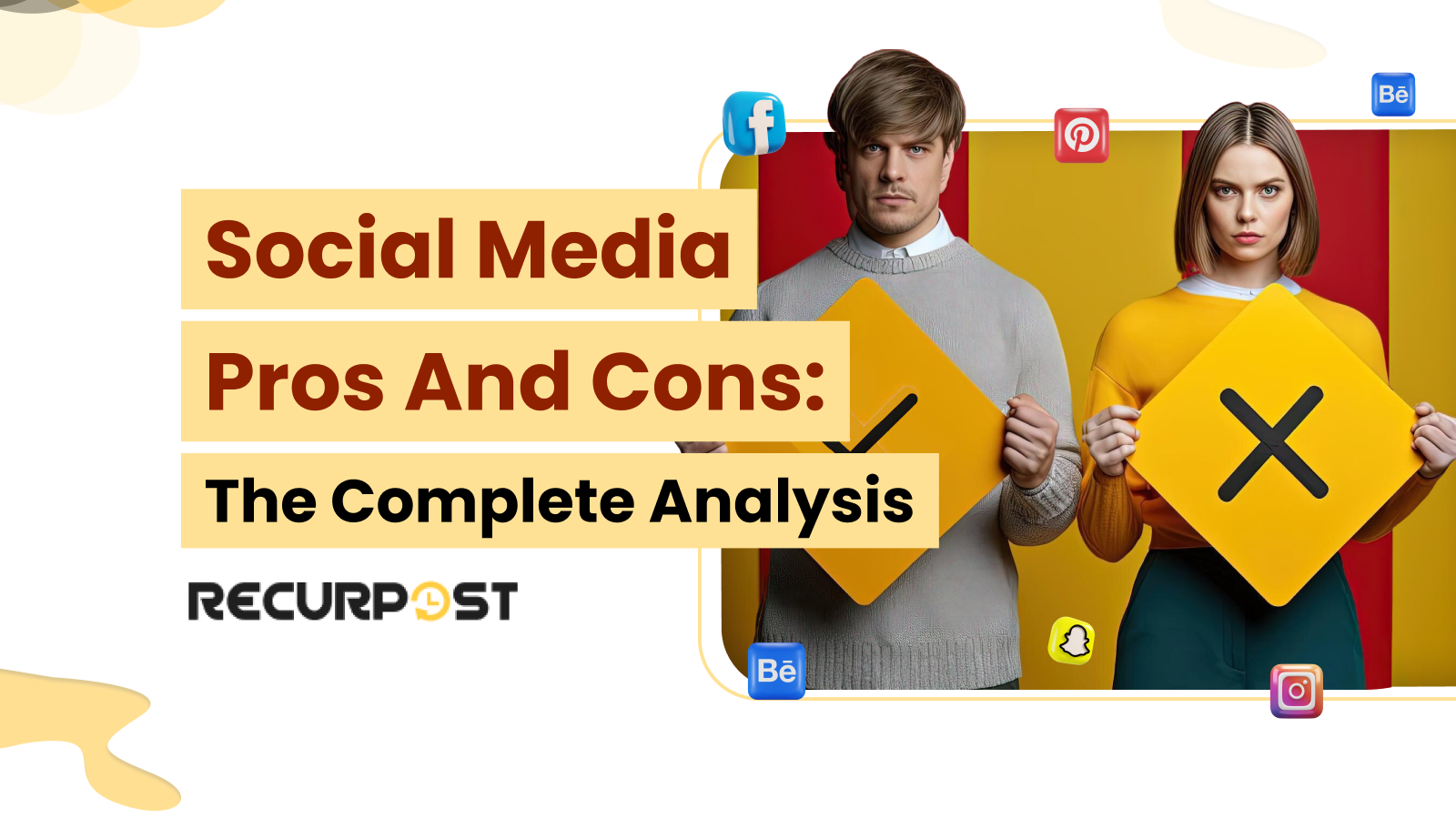Is exploring social media pros and cons your brand’s best friend or its biggest headache?
It can launch startups overnight, connect businesses globally, and turn people into influencers with strong communities. Social media platforms truly transformed the internet. Yet the same tools that fuel growth also spread misinformation, consume hours, and raise privacy concerns.
For businesses, entrepreneurs, and marketers, the key lies in how they use social media. Used smartly, it is a powerful marketing tool that boosts sales, visibility, and customer loyalty. Used poorly, it becomes noise, a distraction, and wasted budget.
In this article, we’ll break down the real advantages and disadvantages of social media, what it offers, what it takes away, and how to make platforms work for your goals instead of against them.
Growing Influence of Social Media on Businesses
Social media platforms have transformed how businesses operate. For small businesses and global brand managers alike, social media usage now forms a core part of business strategy.
Key statistics include:
- Over 5.07 billion active users engage with social media platforms worldwide, and the number keeps rising.
- Around 85% of brands use social media campaigns to increase awareness and engage their target audience
- 75% of marketers state that social media facilitates their business growth.
Social media revolutionized the marketplace. Before social media sites, businesses mainly connected with buyers through emails, phone calls, or store visits.
Social media apps enable businesses to post tweets, update feeds, or reply instantly. This direct engagement with buyers fosters stronger connections and builds trust.
Different Industries Experience Varied Impacts from Social Media
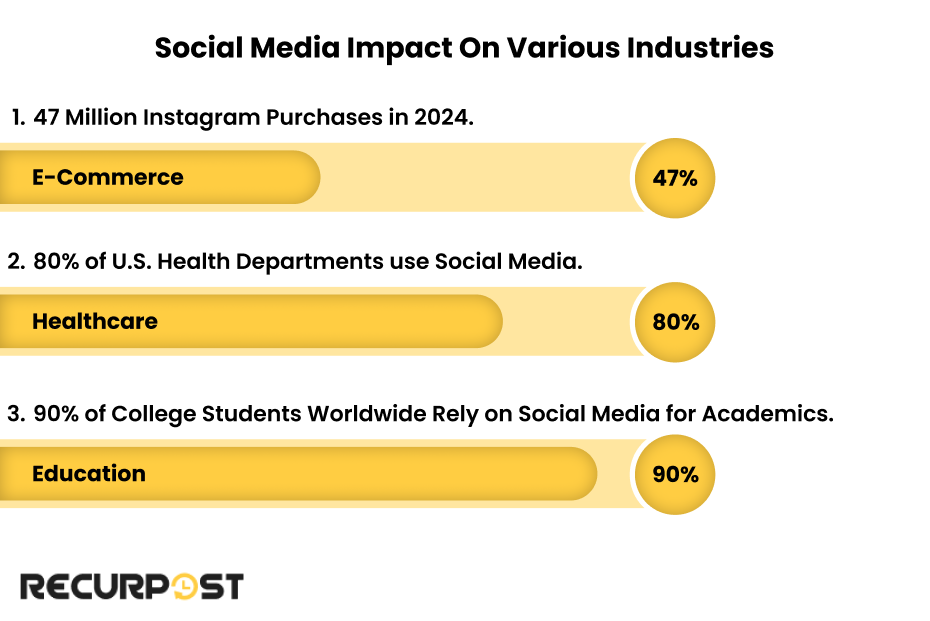
E-commerce
Facebook and Instagram stand out as both offer shopping features that enable consumers to buy directly. This seamless shopping experience revolutionized retail, with nearly 47 million U.S. users expected to purchase through Instagram in 2025.
Healthcare
Social media’s impact is clearly demonstrated in healthcare. Professionals and hospitals use platforms to post information, connect with patients, and promote programs. The NIH reports that 80% of cancer patients using social media communicate with peers facing similar illnesses. Over 80% of U.S. state health departments are active on social media sites.
Education
Institutions leverage social media platforms for communication, sharing materials, and fostering online learning communities. During COVID-19, schools turned to Facebook and YouTube for lessons and updates. Globally, 90% of college students report using social media apps as an educational resource.
Key Benefits of Social Media
- Social media pros include connecting people worldwide instantly. LinkedIn links over 900 million professionals, creating networking advantages, partnerships, and business opportunities.
- Social media platforms encourage idea expression and creativity. Ryan Kaji, just 10, turned his YouTube channel into a global brand, showing how social media benefits convert hobbies into businesses.
- YouTube and LinkedIn offer educational resources. HubSpot reports that 62% of Gen Z use YouTube for learning, enabling skill development anytime.
- Social media also aids information sharing and causes support. Studies reveal 64% of users rely on platforms for current events, proving their role in enabling global communication and civic action.
Social media assists businesses with brand strategy information and audience engagement. Nearly 96% of small businesses use it to promote growth, find leads, and expand their business reach.
Niche online communities flourish on social media sites. Reddit, with 430 million users, enables connections with others who share interests and expertise.
Related: Discover essential concepts and enhance your social media learning!
Key Drawbacks of Social Media
1. Constant comparison on social media feeds negatively impacts mental health. Users face curated highlights, creating unrealistic expectations and self-doubt. This “compare and despair” effect hits teenagers and young adults hardest, leading to mental health concerns like body image issues, FOMO, and reduced satisfaction.
2. Cyberbullying issues remain serious on social platforms. A 2023 Cyberbullying Research Center report shows 37% of students aged 12–17 face online harassment, highlighting the urgent need for stronger protections.
3. The rapid spread of misinformation plagues social media sites. Users should verify sources, since fake news harms individuals and communities. Studies show false stories spread six times faster than the truth, fueling conspiracy theories, health misinformation, and public safety threats.
4. Social media addiction harms productivity and mental well-being. Excessive social media usage disrupts balance, reduces focus, and triggers burnout. Research links overuse to poor sleep, lower academic results, and impaired cognition, especially memory and concentration.
5. Algorithms often create echo chambers by pushing content you already believe. Social networking sites amplify this effect, fostering prejudice and polarizing views. This lack of algorithm transparency reduces exposure to diverse perspectives, hurting critical thinking and fueling political divides.
Explore: Top 100 social networking sites!
Privacy and Data Security Risks
Social media platforms collect vast amounts of personal data, from browsing habits to location details and digital footprints. This data collection scope raises serious privacy concerns, since information may be shared, used for generating targeted advertising, or accessed by unauthorized parties.
Data breaches have exposed millions of users’ information, with major social media sites facing security concerns that compromise privacy.
Additionally, facial recognition tools and tracking features build detailed profiles of user activities and relationships, raising issues of surveillance, privacy risks, and personal autonomy in the age of platform policies.
Pros of Social Media Marketing for Business
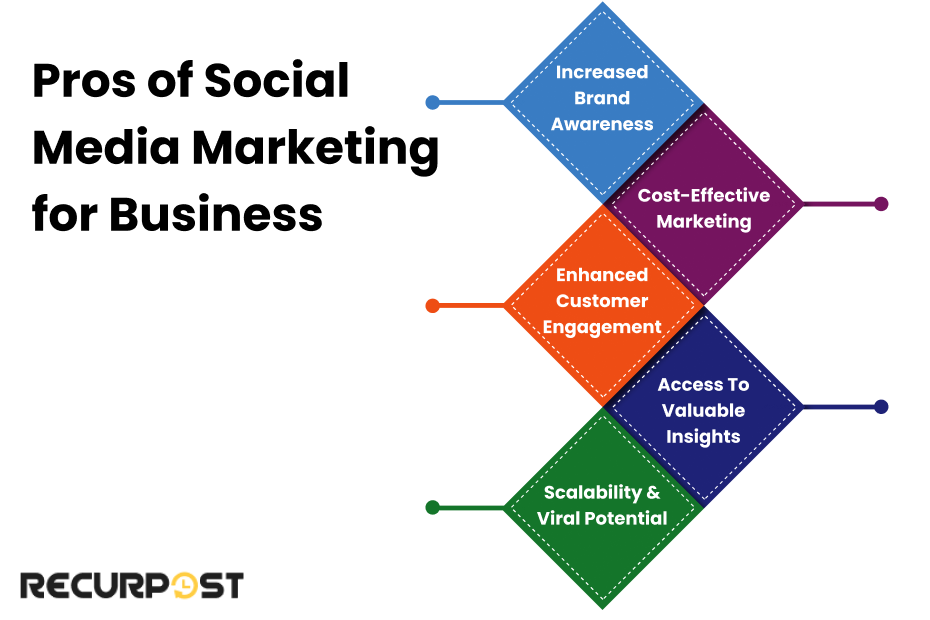
Increased Brand Awareness
Social media platforms expand business reach with minimal investment. Businesses connect with millions globally through Instagram, Twitter, or Facebook.
Over 4.8 billion active users rely on social media apps, giving businesses vast audiences. Spotify leverages social media benefits to increase awareness, reaching millions of users with every playlist launch.
Cost-Effective Marketing
Social media marketing costs less than traditional advertising through TV, radio, or print. Businesses run highly targeted ads for a fraction of the cost, reaching specific demographics matching customer profiles.
Facebook ads, for example, allow you to set your budget and target users based on location, age, interests, and behaviors. The result? You get more bang for your buck without blowing your marketing budget.
Enhanced Customer Engagement
Audience engagement is a major social media benefit. Unlike one-sided ads, platforms enable two-way communication in real time.
A survey shows 64% of consumers expect companies to engage with them on social platforms, proving interaction is vital for customer satisfaction.
Access to Valuable Insights
Social analytics tools, like Sprout Social, fuel smarter decisions, strategy updates, and relevant content creation. Positive responses to behind-the-scenes posts shape brand strategies.
Scalability & Viral Potential
Social media usage enables small business growth. Effective campaigns can go viral, amplifying brand reach overnight.
For example, the ALS Ice Bucket Challenge went viral on Facebook in 2014, raising $115 million for ALS research. This case shows how social media pros allow businesses, large or small, to tap into viral reach and recognition.
Real-World Success Stories
Several businesses have achieved incredible success through social media marketing, leveraging marketing terms to optimize their strategies and prove just how effective these platforms can be.
- Glossier used Instagram’s advantages to grow from a startup to a $1.2 billion brand, raising $100 million in Series D funding by 2019. By reposting user content and listening to their community, they boosted loyalty.
- Dollar Shave Club ran a viral campaign with a humorous video that drew millions of views. Subscriptions surged, and the company was later acquired by Unilever for $1 billion, demonstrating significant marketing effectiveness.
These examples demonstrate businesses leveraging social media to amplify their reach, engage with their audience, and grow rapidly.
Cons of Social Media for Business
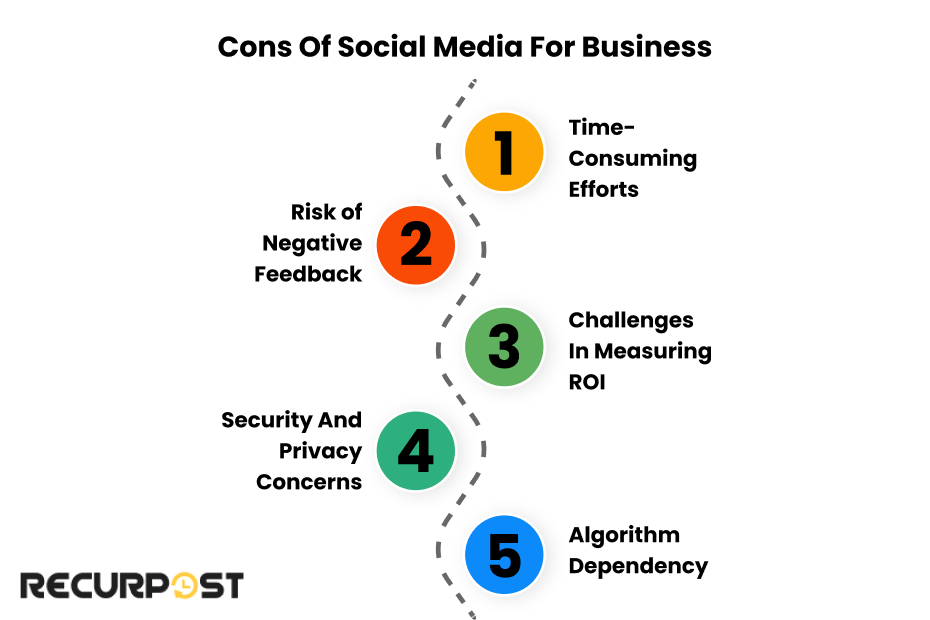
Time-Consuming Efforts
Keeping an active social media presence requires heavy commitment. Companies must create, schedule, and engage across many social media sites. For small businesses, this often diverts focus from other tasks.
Managing multiple social media platforms takes time. Tools like RecurPost consolidate management, schedule posts, and provide social analytics. A survey notes that 61% of marketers struggle with consistent content creation, impacting audience engagement.
Risk of Negative Feedback
While audience engagement is vital, social platforms also expose brands to complaints and public criticism. Without prompt response, reputation suffers.
A negative tweet or Facebook post can go viral, harming brand image. In 2017, United Airlines faced a PR disaster when passenger removal went viral, proving the cons of social media.
Challenges in Measuring ROI
Tracking ROI is tough in digital marketing. Linking social media usage to sales is complex, especially when campaigns aim at brand awareness or loyalty, not direct ads.
Social media analytics tools like Google Analytics help, but linking social media impact directly to sales is still difficult.
Security and Privacy Concerns
Social media platforms hold vast personal data, drawing hackers. Data breaches and rising privacy concerns affect businesses as customers grow cautious.
A 2024 Pew Research Center study shows 89% of Americans worry about how platforms handle their data, underlining privacy risks.
Algorithm Dependency
Algorithm changes on social networking sites impact brand visibility. Facebook’s algorithm updates reduce organic reach, forcing businesses to purchase ads to maintain engagement levels.
Businesses reliant on organic reach face risks when algorithms shift suddenly, proving the disadvantages of social media for marketing consistency.
Common Pitfalls to Avoid in Social Media Marketing
1. Ignoring Audience Feedback
Failing to respond promptly on social platforms harms brand reputation. Since 60% of consumers expect replies within an hour, timely audience engagement is critical for customer care.
2. Over-promotion & Lack of Engagement
Excessive promotion without social media engagement alienates followers. 74% of users prefer brands that build online communities with informative content, not just “buy now” posts.
3. Inconsistent Branding
Mixed tone across social media sites confuses audiences. Keep consistent style on Facebook, Instagram, and Twitter to build brand strategy information, trust, and recognition.
4. Relying Solely on Paid Ads
Ads improve visibility but cannot replace organic social media campaigns. Brands that balance organic growth and paid ads get the best results. Ads should complement, not dominate.
5. Underestimating Algorithm Changes
Evolving algorithms on social networking sites bury content if ignored. For example, Instagram advantages include prioritizing engagement, so brands must adapt quickly to sustain visibility.
Social Media Pros and Cons: Algorithms
Pros of Social Media Algorithm
1. Personalized Content Delivery
Social media algorithms are designed to show users content that matches their interests. By tracking user behavior, platforms like Facebook and Instagram ensure that your posts are shown to the most relevant people. This helps you reach your ideal audience with more precision, which increases the likelihood of engagement.
2. Increased Engagement Opportunities
Algorithms reward content that generates high engagement. When your posts get more likes, shares, and comments, they get pushed to a broader audience. This creates more opportunities for you to engage with social media users and build relationships. Relevant, engaging content can create a snowball effect, generating more visibility and interaction.
3. Better Ad Targeting
A core advantage of social media algorithms is precise ad targeting. By analyzing collected data on user preferences and demographics, campaigns become more effective, maximizing marketing effectiveness (67%).
Cons of Social Media Algorithm
1. Reduced Organic Reach
Disadvantages of social media algorithms include limiting unpaid reach. Platforms push paid ads and high-engagement posts, forcing businesses to adjust strategies or increase spending.
2. Dependence on Platform Changes
Constant updates make visibility unpredictable. Businesses heavily reliant on one social media platform face business risks when algorithm changes disrupt strategy.
3. Content Saturation
Excessive social media usage clogs feeds with ads and stories, making it tough to stand out. Brands must create content that sparks audience engagement to cut through the noise.
Understanding Algorithm Challenges
- Adapting to Algorithm Changes
Keep pace with algorithm changes by tracking platform policies, reviewing updates, and adjusting content. Following industry blogs, webinars, and peers keeps social media strategies current.
- Balancing Organic and Paid Strategies
While organic social media campaigns matter, paid ads boost visibility. Businesses should combine both, using targeted advertising generation to amplify posts and sustain growth.
- Leveraging Multiple Platforms
Don’t rely on one network. Social media platforms like Facebook, Instagram, LinkedIn, and TikTok have positives and negatives that vary. Diversifying ensures that if one algorithm shifts, the reach remains stable elsewhere.
Case Studies and Research Findings on Social Media
Positive Effects of Social Media
MeToo and Black Lives Matter are indicators of how social media has been able to propel strong social movements. The #MeToo movement began with Alyssa Milano’s tweet in 2017, spread like wildfire on Twitter, and thousands of people, including celebrities, came out and shared their experiences of being sexually harassed. This gender equality and workplace misconduct debate took flight globally.
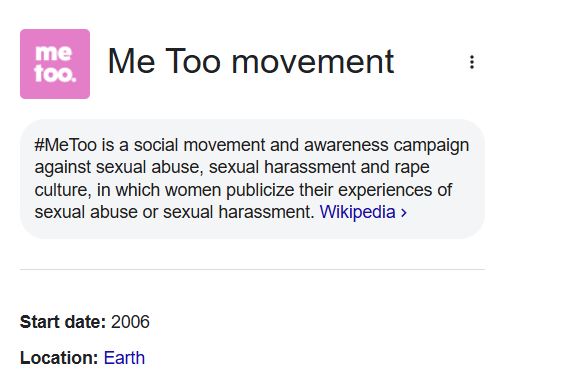
Similarly, #Black Lives Matter, launched as a hashtag, became global on Twitter and Instagram, driving protests, policy debates, and awareness of racial injustice.

Social media has also been a source of support groups and online communities, particularly in the mental health space. For example, #MentalHealthAwareness on Twitter has brought together people experiencing mental health issues, enabling them to exchange personal stories and tips.
Facebook groups, such as The Anxiety and Depression Support Group, provide a support group atmosphere where people meet, exchange survival tips, and seek support.
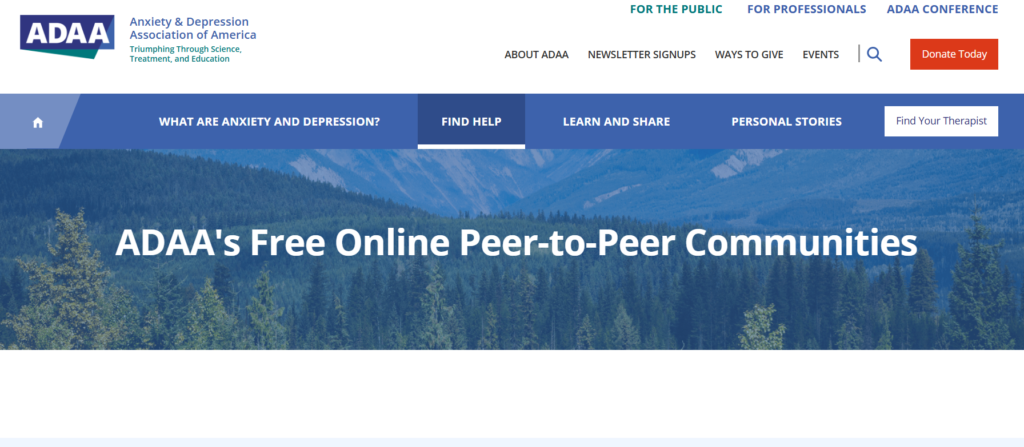
Negative Effects of Social Media
Social media usage has also been associated with mental illness, especially among adolescents. An American Psychological Association report concluded that heavy usage of social media is associated with increased loneliness, depression, and anxiety in teens, kids, and children.
Social media also creates psychological distress through curated online images. Individuals tend to compare themselves with idealized others they observe on social media, leading to feelings of inadequacy or low self-esteem.
Strategies for Responsible Social Media Use
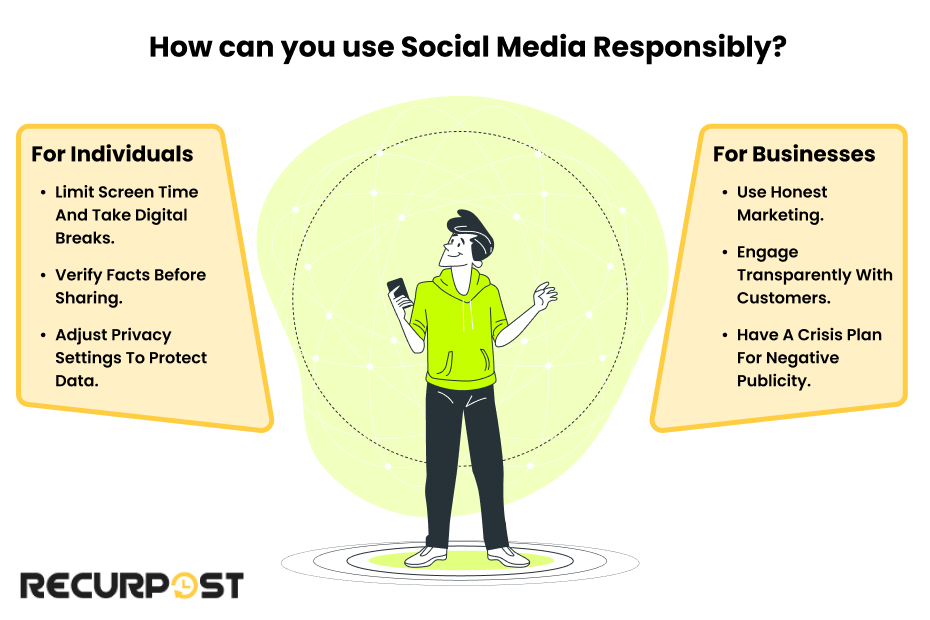
For Individuals
- Set screen time limits and digital detox breaks: Digital detox breaks disconnect you from constant streams, protecting mental well-being and reducing burnout.
- Fact-check before sharing: Always verify sources to avoid misinformation spread (high rate) and the dangers of fake news.
- Adjust privacy settings: Control your data sharing and reduce privacy risks in an age of data breaches and platform policies.
For Businesses
- Practice ethical digital marketing. Avoid misleading ads or deception, and stay transparent to build trust.
- Invite open engagement. Promote audience engagement by responding to customers, offering value, and fostering community building.
- Create crisis management plans. Since social media pros and cons can shift quickly, prepare for bad publicity with strategies to protect brand reputation.
Striking the Right Balance in the Online Era!
Social media delivers connectivity benefits and business growth facilitation, but also poses challenges that impact society. Understanding Social Media Pros and Cons helps businesses use platforms more effectively.
Both businesses using social media for marketing and individuals seeking information access must balance usage. People should focus on meaningful discussions, verify facts, and set boundaries to avoid excessive social media usage.
To handle social media benefits and risks, tools like RecurPost can be used to manage Social media platforms, automate social media campaigns, and save time. Focus on strategy while minimizing the disadvantages of social media marketing and boosting marketing effectiveness (67%).
Master social media by controlling platforms instead of letting them control you. Stay connected while engaging responsibly and protecting mental health.
FAQs on Social Media Pros and Cons
1. Is social media contributing to shorter attention spans?
Yes, this is one of the social media cons that users should be mindful of. Constant scrolling and quick content formats train your brain to crave instant gratification, making it harder to focus on longer tasks. Studies suggest heavy social media use is linked to reduced attention spans and difficulty with deep work.
2. How does social media impact real-life relationships?
Among the pros and cons of social media, staying connected is a plus, but excessive use often reduces face-to-face conversations and increases loneliness, showing the risks of excessive social media.
3. What are the risks of deepfake technology and AI-generated content on social media?
Deepfakes can spread misinformation, manipulate opinions, and damage reputations. With AI-generated content becoming more realistic, it’s harder to distinguish real from fake, making fact-checking essential before believing or sharing anything online.
4. Can quitting social media improve mental health?
Reducing or quitting social media can lower anxiety, improve focus, and boost self-esteem. Research shows people who take breaks from social media often report feeling less stressed and more engaged in real-world activities.
5. How do social media platforms make money if they are free to use?
Social media platforms generate revenue primarily through targeted advertising. They collect user data to serve personalized ads, partner with businesses for promotions, and monetize premium features or subscriptions.
6. What are shadow banning and content suppression, and how do they affect users?
Shadow banning occurs when platforms limit a user’s content visibility without notifying them. This can reduce engagement and reach, often due to algorithm changes or policy violations, affecting creators and businesses relying on organic growth.
7. What are the social media pros and cons of advertising?
Social media ads help you reach a targeted audience, boost brand awareness, and track real-time results. However, they come with challenges like ad fatigue, algorithm changes, and high competition. To get the best results, you’ll need to constantly optimize your campaigns and stay updated with platform trends
8. Can I use this article as a resource for a social media pros and cons essay or debate?
Absolutely. This guide covers Social Media Pros and Cons, giving balanced points for a social media pros and cons essay or social media pros and cons debate. Key highlights even work as an infographic.
9. How does social media affect children and teenagers differently from adults?
Children and teenagers are particularly vulnerable to social media’s negative effects due to their developing brains and social identity formation. Young users are more susceptible to cyberbullying, body image issues, and sleep disruption from excessive screen time. The adolescent brain’s reward system makes them more prone to social media addiction, while constant comparison with peers can intensify feelings of inadequacy during crucial developmental years. Parents should monitor usage, set appropriate boundaries, and encourage offline activities to promote healthy development.

Shalini Nagar is an experienced content writer with a proven track record of creating diverse and engaging content across various formats. With years of expertise in crafting blogs, articles, she excels at delivering compelling narratives tailored to different audiences.

